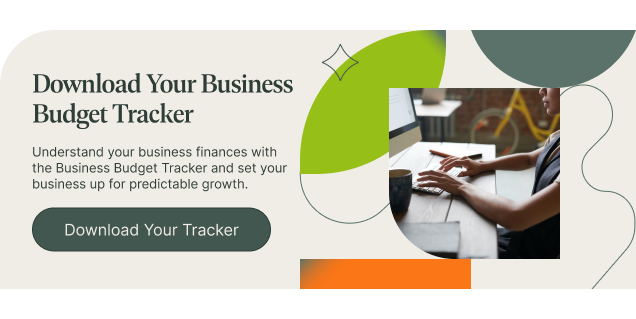Share this
5 Things to Know about Accounting When Starting a Business
by Fundid on May 11, 2023 7:33:00 AM
As a small business owner, it can be easy to overlook the importance of accounting amidst the hustle and bustle of running a business. However, maintaining accurate and up-to-date accounting records is essential for the success and longevity of your business.
Good accounting practices can help you make informed decisions, manage your finances effectively, and comply with regulations. By understanding the basics of accounting and implementing sound accounting practices, you can avoid financial pitfalls and ensure the financial health of your business. So, let's dive into the accounting world and discover how it can benefit your small business.
#1. Understanding Accounting Basics
Understanding the basics of accounting is essential for any small business owner who wants to ensure their business's financial health and success.
At its core, accounting is the process of tracking, analyzing, and reporting financial information. This information can be used to make informed decisions, plan for the future, and comply with regulations. One key distinction to remember is the difference between bookkeeping and accounting.
- Bookkeeping refers to the day-to-day tasks of recording financial transactions. Accounting involves analyzing and interpreting that information to make strategic decisions.
As you dive deeper into the world of accounting, you'll encounter a variety of key terms and concepts. For example, balance sheets, income statements, and cash flow statements are tools and reports that can help you understand your business's financial health. Under those three financial statements more by reading this guide.
#2. Choosing an Accounting Method
When it comes to accounting, an important decision that small business owners should make is choosing an accounting method. Cash and accrual accounting are the two most common methods, and each has advantages and disadvantages.
With cash accounting, transactions are recorded when cash changes hands. This method is straightforward, making it a popular choice for small businesses. However, it can also lead to inaccurate financial reporting if cash flow doesn't reflect the accurate financial picture of the business.
Accrual accounting, however, records transactions when they occur, regardless of when cash changes hands. This provides a more accurate representation of the business's financial health but can be more complex and time-consuming to manage.
When choosing an accounting method for your small business, it's essential to consider your business's specific needs and goals. Consider factors such as your industry, revenue streams, and the complexity of your financial transactions.
Cash accounting is a good choice for many small businesses due to its simplicity and ease of use. However, as your business grows and your financial needs become more complex, you may need to consider transitioning to accrual accounting.
No matter which method you choose, taking a proactive approach to accounting can help you stay on top of your finances and make informed decisions about the future of your business.
#3. Setting Up an Accounting System
Setting up an effective accounting system is crucial for the success of any small business. Not only does it ensure accurate financial reporting and compliance with regulations, but it can also help you make informed decisions and manage your finances more efficiently.
There are a few key steps to set up a basic accounting system for your small business to follow:
- Determine your accounting needs - Consider your business's unique financial situation and the types of transactions you'll be recording.
- Choose an accounting method - Decide whether cash or accrual accounting is right for your business.
- Set up a chart of accounts - This is a list of all the accounts you'll use to track your financial transactions. It helps keep everything organized and makes it easier to generate reports later on.
- Record transactions - Start recording all financial transactions using a system that works for you (such as a manual ledger or accounting software).
When choosing and using accounting software, various options are available for small businesses, such as Quickbooks, Freshbooks, and Xendoo. Consider factors such as the software's ease of use, cost, and integration with other tools and systems. Many accounting software programs also offer invoicing, payroll management, and financial reporting features.
Don't be afraid to seek resources and support to help you along the way - your investment in your accounting system will pay off in the long run.
Fundid Recommendation: If you want to get your accounting set up with ease, consider using Quickbooks to track your income and expenses. Save 30% on your first six months when you sign up through Fundid! But if you're looking to outsource your accounting - our partners at Bench can handle your bookkeeping for you monthly. Try Bench out and save 30% on your first three months!
#4. Managing Cash Flow
As a small business owner, managing cash flow effectively is one of the most important things you can do to ensure the long-term success of your business. A healthy cash flow allows you to pay your bills, invest in growth, and weather any unexpected challenges.
One essential tool for managing cash flow is the cash flow statement. This document tracks the flow of money in and out of your business over a specific period. It includes information on cash inflows (sales revenue and investments) and cash outflows (expenses and debt payments).
By creating a cash flow statement and using it to analyze your business's cash flow patterns, you can identify potential problems and take proactive steps to address them. For example, suppose your cash outflows consistently exceed your cash inflows. In that case, you may need to adjust your expenses or find ways to increase revenue.
In addition to using a cash flow statement, there are several best practices that small business owners can follow to manage cash flow effectively. These include:
- Keeping track of receivables and payables: Monitor the money owed to you by customers (receivables) and the money you owe to suppliers or creditors (payables).
- Staying on top of invoicing and payments: Send out invoices promptly and follow up on late payments.
- Keeping a cash reserve: Set aside a portion of your cash flow as a reserve to help you weather any unexpected expenses or fluctuations in cash flow.
- Planning for the future: Create a cash flow forecast to anticipate future cash needs and plan accordingly.
By following these best practices and staying on top of your cash flow management, you can ensure that your small business remains financially healthy and prosperous for years to come.
#5. Hiring an Accountant
As your small business grows and becomes more complex, you may face more complex accounting challenges that require the expertise of a professional accountant. Hiring an accountant can help you to stay on top of your finances, make more informed business decisions, and free up time to focus on other aspects of your business. If you aren't ready to hire a full-time accountant, companies like Bench offer bookkeeping services to small businesses for a monthly fee.
Several different types of accountants may be able to help your business, including:
- Certified Public Accountants (CPAs): These professionals are licensed by the state and are qualified to handle a wide range of accounting services, including tax planning and preparation, financial analysis, and auditing.
- Enrolled Agents (EAs): These professionals are licensed by the IRS and specialize in tax-related issues, including tax planning and preparation and representing clients in IRS matters.
- Bookkeepers: These professionals handle the day-to-day recording of financial transactions, including payroll, accounts payable and receivable, and bank reconciliations.
When it comes to finding and hiring the right accountant for your business, there are a few key steps to follow:
- Determine your accounting needs - Consider the specific accounting services your business requires and your budget.
- Ask for referrals - Reach out to other small business owners or professional organizations for recommendations.
- Conduct interviews - Meet with potential accountants to discuss their qualifications, experience, and fees.
- Check references - Ask for references and follow up to ensure the accountant has a good track record of working with small businesses.
Accounting For Your Small Business
Starting a business can be intimidating, but accounting doesn't have to make the task even harder. By understanding the fundamentals of business accounting, setting up a sound system, and hiring an experienced accountant, small business owners can pave the way to better financial decisions and long-term success.
Financial planning is essential for a new venture, so becoming educated on accounting basics is wise. These steps will give a clearer picture of where money is going and coming from, thus providing more accurate information when making crucial decisions about capitalizing investments or expanding services. Do not underestimate the importance of effectively knowing how to use accounting strategies within your business!
Keep Your Books Organized and Save With Fundid!
At Fundid, you can save on the tools you need to grow your business and keep your financials healthy. Explore our growth partners and find exclusive discounts just for Fundid members.

